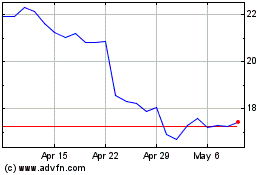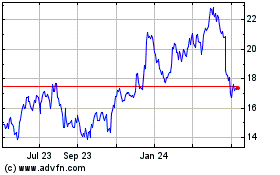By John W. Miller And Juliet Samuel
The mining dividend party is over.
For more than a decade, as the China-led commodity boom drove
profits at miners around the world, seemingly never-ending generous
dividends helped to attract investors. Between 2012 and 2014, for
example, Phoenix-based Freeport-McMoRan Inc., the U.S.'s biggest
miner, paid out $4.7 billion in dividends, according to securities
filings.
But Anglo-American PLC's announcement Tuesday that it would
slash its dividend as part of a downsizing reaffirmed a new
investment reality during what is proving to be a deep and lasting
downturn for commodities' producers. With Chinese demand slowing
and profits sliding, companies are putting their own survival
before the short-term interests of their shareholders.
Already this year, Freeport McMoRan Inc., Glencore PLC, Cliffs
Natural Resources Inc., First Quantum Minerals Ltd., Peabody Energy
Corp., Teck Resources Ltd. and Vale SA have cut dividends, citing
lower commodity prices.
Many investors are getting spooked. Matthew Tillett, a
London-based fund manager at Allianz Global Investors, said the
share prices of many miners have fallen in part because investors
no longer expect a steady dividend. "People don't believe these
dividends," he said. "If I'm buying these companies, I'm not buying
them for the dividend. I'm buying them because I think they're
undervalued."
To be sure, there are exceptions. BHP Billiton, Ltd. and Rio
Tinto Group have kept their dividends, partly because of an
Australian tax break, analysts said.
Some investors also say gutting dividends to pay off debt is
common sense. "I think companies would be wise to cut dividends,"
Evy Hambro told delegates at the Mines and Money conference in
London last week. "In general, the absence of cash flow will put
pressure on dividends," said Mr. Hambro, who runs BlackRock Inc.'s
$3.5 billion World Mining Fund.
Investors also said the dividend cuts and other facets of the
mining slowdown are forcing stock buyers to be more selective. "You
now have to pick more carefully as you wait out the cycle," said
Olivier Tielens, a Brussels-based private mining investor and
consultant.
Mr. Tillett, the Allianz fund manager, said he is considering
buying shares in Antofagasta PLC, a Chilean copper producer with
mines, and First Quantum Minerals Ltd., a Canadian copper producer,
because the price of copper is more likely to rise than other
commodities like iron ore.
The run-up in commodity prices spurred mining companies to adopt
and increase dividends to attract investors who placed a priority
on steady payouts, fund managers said.
In 2011, gold miners Newmont Mining Corp. and Eldorado Gold
Corp. announced dividends that would increase as the gold price
rose. That approach was aimed at making their shares more appealing
to investors who, during good times, increasingly favored
exchange-traded funds tied to the performance of the metal price.
Such funds allow investors to benefit from a rising metal price
without taking on the operational and geopolitical risk that comes
with a miner's stock.
But the flurry of dividend cuts exposes the risks investors face
betting on producers paying out a steady income stream when cash
flow is subject to sharp moves in commodity prices. "A lot of times
(the strategy) didn't seem to fit, and I think you are seeing that
come home to roost," said Greg Eckel, a portfolio manager at Morgan
Meighen & Associates in Toronto.
One of the most generous payers has been Freeport, which is the
biggest U.S. mining company by market value. But after paying out
$4.7 billion between 2012 and 2014, it will distribute a fraction
of that this year. In March, Freeport said it would pay a cash
dividend of $0.05 per share, down from a previous rate of $0.3125
per share "in response to the impact of lower commodity prices."
Freeport said its board "reviews its financial policy on an ongoing
basis and has a long-standing practice of distributing cash to
shareholders."
Anglo followed suit on Tuesday, saying it would cut 85,000 jobs,
radically downsize and suspend its dividend payments for the second
half of 2015. The dividend cut, which is expected to save $1.7
billion through 2016, was reported last week by The Wall Street
Journal.
"No ones likes to suspend a dividend," said CEO Mark Cutifani.
"We think it's the right thing to do to make sure the company
remains in good shape."
Anglo's biggest investor said it understood.
"Dividend is only payable when the business is generating free
cash," said Fidelis Madavo, an executive at South Africa's
state-owned Public Investment Corporation Ltd., Anglo's largest
shareholder. When a business is in trouble, "I would not expect
management to pay dividend with one hand and ask for money with the
other hand," he added. "We are a pension fund, we like dividends
[but] we don't like dividends at any cost."
Alex MacDonald, Scott Patterson and Ben Dummett contributed to
this article.
Write to John W. Miller at john.miller@wsj.com and Juliet Samuel
at juliet.samuel@wsj.com
(END) Dow Jones Newswires
December 08, 2015 16:13 ET (21:13 GMT)
Copyright (c) 2015 Dow Jones & Company, Inc.
Cleveland Cliffs (NYSE:CLF)
Historical Stock Chart
From Mar 2024 to Apr 2024

Cleveland Cliffs (NYSE:CLF)
Historical Stock Chart
From Apr 2023 to Apr 2024
